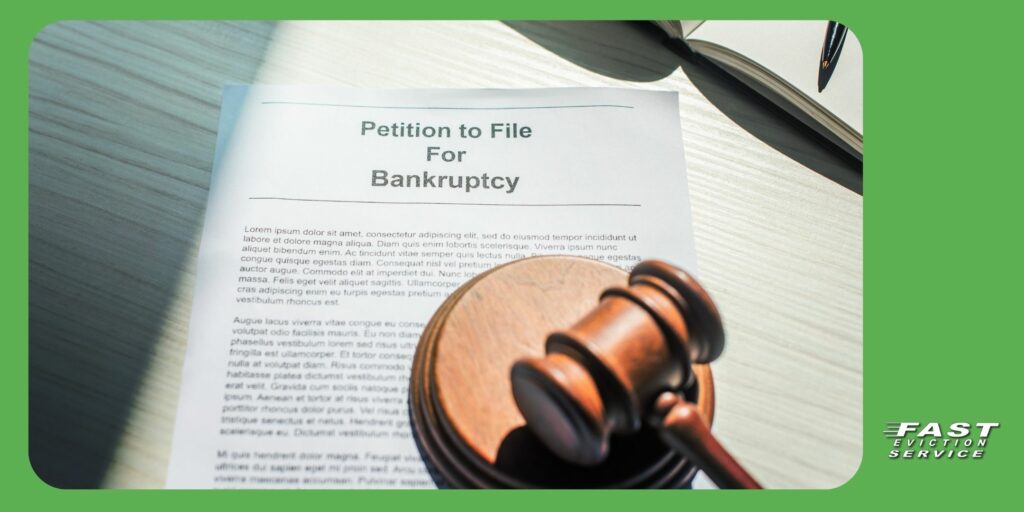Residential & Commercial Evictions | You are represented at all times by one of our California Eviction Attorneys | 1-800-686-8686 | intake@fastevict.com | Se habla español
Can You Evict a Tenant Who Filed for Bankruptcy?
Tenant bankruptcy and eviction can be one of the most confusing and frustrating situations a landlord may face. Between federal protections, state laws, and strict court procedures, understanding your rights and the limits of what you can do is essential. Whether the tenant filed before or after the eviction process began will significantly influence your next steps.

Bankruptcy was designed to give debtors a second chance—but what about landlords who just want to reclaim their property and move forward? Fortunately, federal law has evolved, particularly with the Bankruptcy Abuse Prevention and Consumer Protection Act (BAPCPA) of 2005, giving landlords clearer guidance on how to proceed.
Too Long Didn’t Read (TL;DR):
If a tenant files for bankruptcy after an eviction judgment, you may still be able to proceed with eviction under specific conditions. The automatic stay may apply, but there are key exceptions for drug use, property damage, and cure rights. Whether the bankruptcy was filed before or after the judgment, understanding your rights and how to lift the stay is essential to reclaiming your unit legally.
Table of Contents
- What Happens If a Tenant Files for Bankruptcy After an Eviction Judgment?
- Can a Tenant Stop an Eviction by Curing Rent After Bankruptcy?
- How Does the Automatic Stay Affect Landlords?
- Filing a Motion to Lift the Stay: What Landlords Need to Know
- Exceptions to the Automatic Stay: Illegal Drug Use or Property Endangerment
- What to Do If the Tenant Filed Bankruptcy Before You Filed for Eviction
- Timeline and Legal Requirements for Filing Certifications in Bankruptcy Court
- Should You Hire a Lawyer When a Tenant Files for Bankruptcy?
- State Law Differences in Tenant Bankruptcy Evictions
- Tips for Navigating Tenant Bankruptcy as a Landlord
- Frequently Asked Questions About Tenant Bankruptcy and Eviction
What Happens If a Tenant Files for Bankruptcy After an Eviction Judgment?
In most cases, the eviction process becomes complicated once a tenant files for bankruptcy. However, if you already have a court-ordered eviction judgment before the bankruptcy is filed, you generally have the upper hand. Thanks to the 2005 BAPCPA reform, the automatic stay no longer prevents eviction if the judgment for possession was granted before the bankruptcy petition. This allows landlords to regain possession even when bankruptcy protection is in play.
Still, landlords should proceed with caution. If your tenant attempts to cure the rent or files certain certifications, your ability to act immediately may be delayed. Understanding how bankruptcy after eviction judgment affects your timeline will help prevent any legal missteps.
Can a Tenant Stop an Eviction by Curing Rent After Bankruptcy?
While most states don’t permit tenants to cure unpaid rent after a judgment has been entered, some do. In these rare cases, a tenant might be able to stop an eviction by paying the full delinquent rent within 30 days of filing for bankruptcy. This process involves submitting a sworn certification to the bankruptcy court and depositing rent payments.
For landlords, it’s critical to monitor the timeline. If the tenant complies with cure procedures under local law, the eviction must be paused. If not, you may proceed. Tenants who abuse this process often delay eviction but rarely follow through, so staying aware of deadlines and legal filings is key.
How Does the Automatic Stay Affect Landlords?
When a tenant files for bankruptcy, an automatic stay goes into effect. This federal protection temporarily halts all collection efforts, including evictions, lawsuits, and communication about overdue rent. The automatic stay is a serious legal tool that protects debtors, but it doesn’t always stop an eviction entirely.
Landlords must understand that even sending a notice of termination can violate the stay. Instead, the next step is filing a motion in bankruptcy court requesting the stay be lifted. You cannot take action on your own, even if you think you’re within your rights.
Filing a Motion to Lift the Stay: What Landlords Need to Know
The primary way to continue with eviction during tenant bankruptcy is to file a motion to lift the stay. This legal document asks the bankruptcy court for permission to proceed based on your judgment, the type of lease, and the tenant’s behavior.
The judge will review whether the lease affects the bankruptcy estate. In most residential cases, it does not, and the court will lift the stay. If the tenant is behind on rent or has breached the lease, you stand a good chance of success.
Be prepared to show documentation, including the lease agreement, court judgment, rent ledger, and any notices served. The better your record-keeping, the more efficiently the court can process your request.
Exceptions to the Automatic Stay: Illegal Drug Use or Property Endangerment
Landlords do not need to request permission from the court to proceed with an eviction if the basis involves illegal drug use or if the tenant endangers the property. However, there are still procedural steps to follow.
You must file a sworn certification with the bankruptcy court stating the grounds for the eviction. If this certification is filed before the bankruptcy, you may continue. If the drug use or property endangerment occurred after the bankruptcy was filed, you must certify the event occurred within the past 30 days.
Once the certification is served to the tenant, they have 15 days to object. If no objection is filed, you may move forward with the eviction.
What to Do If the Tenant Filed Bankruptcy Before You Filed for Eviction
This is where things get tricky. If the tenant filed for bankruptcy before you started the eviction process, the automatic stay takes effect immediately. This means you cannot serve a notice to vacate, file a complaint, or engage in any collection activity.
Instead, your next move is to file a motion to lift the stay. Courts generally approve these motions when landlords show that the tenant is not paying rent or violating the lease.
Acting without court approval may result in fines or even reversal of your eviction efforts. It’s always better to go through proper channels when a bankruptcy is already in progress.
Timeline and Legal Requirements for Filing Certifications in Bankruptcy Court
Time is critical when dealing with tenant bankruptcy and eviction. Federal law allows for specific windows where actions must be taken, especially when the tenant is attempting to cure past-due rent or when a landlord is filing an exception to the automatic stay.
Understanding these windows—often 15 to 30 days—can make or break your ability to regain possession quickly. If you miss a deadline, you may find yourself starting over or waiting months before you can act again. Always verify with the bankruptcy court and consult your state’s laws.
Should You Hire a Lawyer When a Tenant Files for Bankruptcy?
While some landlords try to handle tenant bankruptcy and eviction on their own, these cases are often complex. Even a small mistake can lead to delays, lost rent, or penalties.
Hiring a local landlord-tenant attorney familiar with both bankruptcy and eviction laws can protect your property and your income. They can prepare court filings, represent you at hearings, and help you comply with both federal and state procedures.
State Law Differences in Tenant Bankruptcy Evictions
Not all states treat tenant bankruptcy and eviction the same way. Some allow tenants more flexibility to cure back rent, while others strictly enforce possession once a judgment is issued.
For example, California landlords may face tighter tenant protections than landlords in Texas. Knowing your state’s specific requirements is vital to developing a legal and effective strategy. If you’re unsure, seek legal advice before proceeding.
Tips for Navigating Tenant Bankruptcy as a Landlord
Document everything. This includes rent ledgers, lease violations, notice dates, and court actions. Communication should always be in writing, and you should avoid discussing the bankruptcy directly with the tenant once the stay is in place.
Stay updated on both state and federal rules. Bankruptcy laws change frequently, and local eviction rules may also evolve. Subscribing to legal updates or working with an experienced eviction service can keep you ahead.
Finally, avoid retaliatory actions. Tenants who file for bankruptcy are protected, and aggressive behavior could jeopardize your legal case.
Frequently Asked Questions About Tenant Bankruptcy and Eviction
Can I evict a tenant after they file for bankruptcy?
Yes, but only under specific circumstances. If you have a judgment for possession before the bankruptcy filing, you may proceed. Otherwise, you’ll likely need to file a motion to lift the stay.
Does bankruptcy erase unpaid rent?
Not always. While bankruptcy may discharge some debts, unpaid rent might still be collectible depending on the bankruptcy chapter filed.
What if the tenant damages my property during bankruptcy?
If property endangerment occurs, you may bypass the stay by filing a certification with the court. You can proceed with eviction unless the tenant objects and proves your claim is false.
Can I talk to the tenant about rent after they file for bankruptcy?
No. The automatic stay prevents communication related to debt collection, including unpaid rent.
Is Chapter 7 different from Chapter 13 for landlords?
Yes. Chapter 7 is usually quicker and may discharge rent faster, while Chapter 13 involves repayment plans that could delay eviction.





